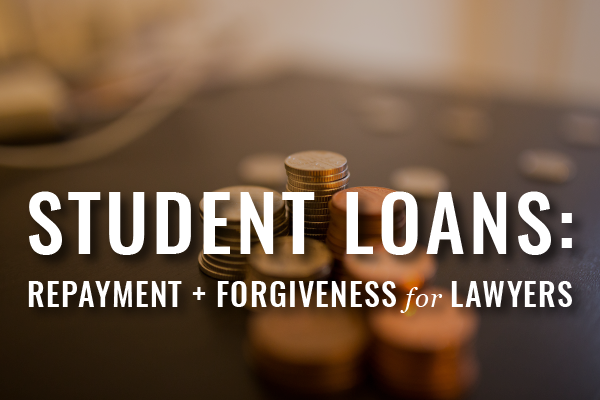As you know, it’s not an easy time to graduate from law school. Student debt has reached outrageous sums. Our guest blogger, Andrew Josuweit knows first-hand about student debt, as he watched his own debt rise to $107,000. He decided to do something about it by founding Student Loan Hero, a company that provides easy-to-use tools and financial education to help students manage their debt and make intelligent repayment decisions. You can learn more about Student Loan Hero at https://studentloanhero.com/ and download their Complete Guide to Loan Forgiveness for Lawyers, here.
Traditionally, going to law school and becoming a lawyer meant you had substantial earning potential, but the high cost of law school along with high rates of unemployment has resulted in challenges for law school graduates.
By example, in Massachusetts, 2015 law school graduates at Northeastern University who took out loans left with an average indebtedness of $127,406; Suffolk University law students on average $138,724 of debt; and Boston University law students on average $102,329 of debt – all schools reporting over 70% of their graduates having debt, according to the U.S. News and World Report.
Student Loan Help for Lawyers
Fortunately, there are a variety of student loan assistance programs that can help – even some designed specifically for lawyers. If you’re a new law school grad struggling under the weight of crushing student loan debt, here are some options to consider:
Department of Justice Attorney Student Loan Repayment Program
The Department of Justice Attorney Student Loan Repayment Program offers some welcome relief to law school graduates who commit at least three years of their career to the Department of Justice and owe at least $10,000 in federal student loans. Students who qualify can receive up to $6,000 in forgiveness each calendar year, with a cap at $60,000. This repayment assistance is considered taxable income.
John R. Justice Student Loan Repayment Program
The John R. Justice Student Loan Repayment Program is another good option if you’re considering a law career in the public sector.
Since this program is administered through Governor-Designated State Agencies, you’ll need to apply through your respective state agency. However, once approved, you could receive up to $10,000 in assistance per year, up to a maximum of $60,000. In exchange, you must commit to working as a public defender for at least three years.
Public Service Loan Forgiveness
Another option for lawyers who plan to work in public service is the Public Service Loan Forgiveness program. Under this program, lawyers who work in a qualified public service position and make consecutive, on-time payments for 120 months can emerge debt free. Even better, forgiven debt is not taxed as income.
The Herbert S. Garten Loan Repayment Assistance Program
Attorneys who work for a grantee of this lottery-style program and have at least $75,000 in student loan debt can apply. About 70 attorneys qualify each year and the program awards up to $5,600 per graduate.
School-Based Loan Repayment Programs
To ease the burden of debt for their students, many schools maintain their own assistance programs. These programs – commonly referred to as LRAPs – each come with their own set of eligibility requirements. The amount of money you’ll receive depends on your specific law school.
State-Based Loan Repayment Assistance Programs
Depending on your state, additional loan repayment assistance may be available. Massachusetts does not have its own loan repayment assistance program, however, the Attorney General’s Office offers resources, including this Student Loan Repayment Guide, that can help graduates recover from student loan debt. By submitting a Student Lending Request for Assistance, you can formally request help from the AG’s Office and receive information on loan resolution and dispute settlement, along with new programs that may be offered in your area.
—
Know that if you are a law school graduate who is suffering from too much debt, you are certainly not alone. Across the country, far too many lawyers endure similar fates and struggle to get ahead. By arming yourself with information about loan repayment programs and seeking out the help that is available, you can ease the burden.
Got Debt? Student Loan Repayment and Forgiveness Programs for Lawyers [Guest Post]
This article is for informational purposes only. It is not intended to be used in place of professional advice, treatment, or care in any way. Lawyers, law students, judges, and other legal professionals in Massachusetts can find more on scheduling a Free & Confidential appointment with a licensed clinician here.




